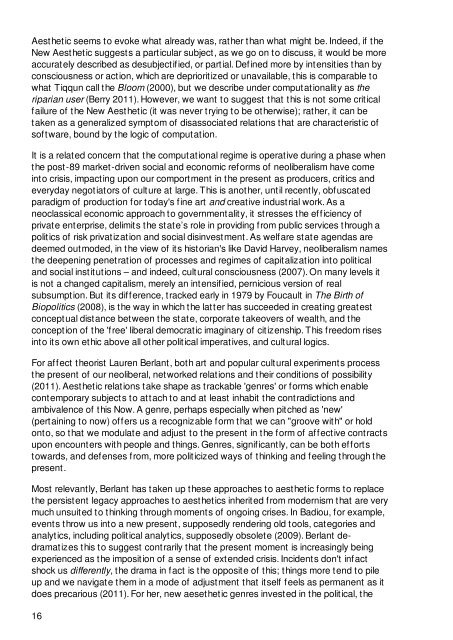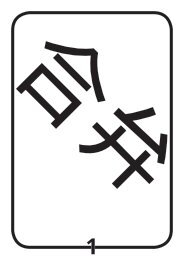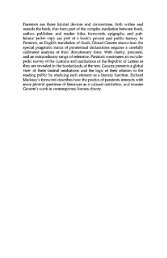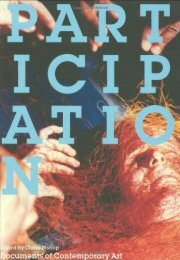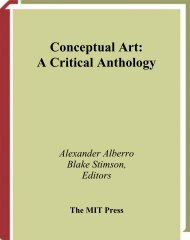New Aesthetic New Anxieties - Institute for the Unstable Media
New Aesthetic New Anxieties - Institute for the Unstable Media
New Aesthetic New Anxieties - Institute for the Unstable Media
You also want an ePaper? Increase the reach of your titles
YUMPU automatically turns print PDFs into web optimized ePapers that Google loves.
<strong>Aes<strong>the</strong>tic</strong> seems to evoke what already was, ra<strong>the</strong>r than what might be. Indeed, if <strong>the</strong><strong>New</strong> <strong>Aes<strong>the</strong>tic</strong> suggests a particular subject, as we go on to discuss, it would be moreaccurately described as desubjectified, or partial. Defined more by intensities than byconsciousness or action, which are deprioritized or unavailable, this is comparable towhat Tiqqun call <strong>the</strong> Bloom (2000), but we describe under computationality as <strong>the</strong>riparian user (Berry 2011). However, we want to suggest that this is not some criticalfailure of <strong>the</strong> <strong>New</strong> <strong>Aes<strong>the</strong>tic</strong> (it was never trying to be o<strong>the</strong>rwise); ra<strong>the</strong>r, it can betaken as a generalized symptom of disassociated relations that are characteristic ofsoftware, bound by <strong>the</strong> logic of computation.It is a related concern that <strong>the</strong> computational regime is operative during a phase when<strong>the</strong> post-89 market-driven social and economic re<strong>for</strong>ms of neoliberalism have comeinto crisis, impacting upon our comportment in <strong>the</strong> present as producers, critics andeveryday negotiators of culture at large. This is ano<strong>the</strong>r, until recently, obfuscatedparadigm of production <strong>for</strong> today's fine art and creative industrial work. As aneoclassical economic approach to governmentality, it stresses <strong>the</strong> efficiency ofprivate enterprise, delimits <strong>the</strong> state’s role in providing from public services through apolitics of risk privatization and social disinvestment. As welfare state agendas aredeemed outmoded, in <strong>the</strong> view of its historian's like David Harvey, neoliberalism names<strong>the</strong> deepening penetration of processes and regimes of capitalization into politicaland social institutions – and indeed, cultural consciousness (2007). On many levels itis not a changed capitalism, merely an intensified, pernicious version of realsubsumption. But its difference, tracked early in 1979 by Foucault in The Birth ofBiopolitics (2008), is <strong>the</strong> way in which <strong>the</strong> latter has succeeded in creating greatestconceptual distance between <strong>the</strong> state, corporate takeovers of wealth, and <strong>the</strong>conception of <strong>the</strong> 'free' liberal democratic imaginary of citizenship. This freedom risesinto its own ethic above all o<strong>the</strong>r political imperatives, and cultural logics.For affect <strong>the</strong>orist Lauren Berlant, both art and popular cultural experiments process<strong>the</strong> present of our neoliberal, networked relations and <strong>the</strong>ir conditions of possibility(2011). <strong>Aes<strong>the</strong>tic</strong> relations take shape as trackable 'genres' or <strong>for</strong>ms which enablecontemporary subjects to attach to and at least inhabit <strong>the</strong> contradictions andambivalence of this Now. A genre, perhaps especially when pitched as 'new'(pertaining to now) offers us a recognizable <strong>for</strong>m that we can "groove with" or holdonto, so that we modulate and adjust to <strong>the</strong> present in <strong>the</strong> <strong>for</strong>m of affective contractsupon encounters with people and things. Genres, significantly, can be both ef<strong>for</strong>tstowards, and defenses from, more politicized ways of thinking and feeling through <strong>the</strong>present.Most relevantly, Berlant has taken up <strong>the</strong>se approaches to aes<strong>the</strong>tic <strong>for</strong>ms to replace<strong>the</strong> persistent legacy approaches to aes<strong>the</strong>tics inherited from modernism that are verymuch unsuited to thinking through moments of ongoing crises. In Badiou, <strong>for</strong> example,events throw us into a new present, supposedly rendering old tools, categories andanalytics, including political analytics, supposedly obsolete (2009). Berlant dedramatizesthis to suggest contrarily that <strong>the</strong> present moment is increasingly beingexperienced as <strong>the</strong> imposition of a sense of extended crisis. Incidents don't infactshock us differently, <strong>the</strong> drama in fact is <strong>the</strong> opposite of this; things more tend to pileup and we navigate <strong>the</strong>m in a mode of adjustment that itself feels as permanent as itdoes precarious (2011). For her, new aese<strong>the</strong>tic genres invested in <strong>the</strong> political, <strong>the</strong>16


